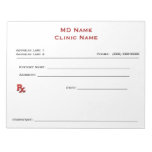Because of this paradigm shift in patients, many practices are implementing a new role within their organizations of a patient experience officer—a designated employee responsible for making sure the entire experience is in line with patients’ expectations.
Managing the patient experience has quickly developed into too big of a role and become too important in retaining patients to not have a dedicated person working on these tasks. Tasks that used to be left to front-desk employees or other staff members “when they had free time” are playing a bigger role in patients’ decisions about healthcare providers, so it is important to make sure the patient experience doesn’t fall through the cracks.
A recent study shows that a growing number of patients who leave their healthcare provider do so not because they aren’t satisfied with the level of care, but because of frustration with practice logistics—things like interactions with staff, scheduling hassles, wait times, and communication processes. Physicians are seeing the importance of having a member of their team always working to improve the experience and ensure patients return to the practice.
The role of patient experience officer can cover a lot of things, but generally this person is responsible for:
• Evaluating patient experience
• Collaborating with other staff to make improvements or changes to patient experience
• Establishing a patient communication plan/program (i.e., reminders, recalls, education, review requests, etc.)
• Addressing patient feedback from surveys and reviews
• Managing online interactions with patients
• Reporting on feedback collected and the effectiveness of programs to improve patient experience
Most organizations look for someone with five to 10 years of experience in a healthcare setting. Previous experience or training in patient-facing roles, customer service, patient engagement activities or tools is generally preferred. While smaller practices may have one person or even just a half-time person, many larger organizations often have a small team of people in this function, so there is room for growth as well. The salary range is considerable and depends on the location and size of the organization. However, on average, a patient experience officer’s wage is between $35,000 and $65,000 based on data available on sites like Indeed.com.
Evaluating the Patient Experience
With so many patients at risk of switching providers for a better experience, creating the position of a patient experience officer is an opportunity to show patients how important they are. Patients want a provider who cares about their wants and needs, not just the revenue coming in. If the practice provides opportunities for patient feedback and incorporates it into their processes, patients will feel heard and valued, and they will be more likely to return to the practice when it comes time to schedule their next appointment.
Establishing a Communication Program
One example of an organization that has successfully created this role is Allied Physicians Group, based in Melville, N.Y. Leslie Tarver is the vice president of patient experience and marketing, and spends her time looking for ways to improve the experience for the 35 locations in the group. One of her recent decisions was to invest in patient relationship management (PRM) software to make communication between patients and providers easier.
“We needed to provide a solution that offered text messaging,” Tarver said. “We saw that’s where our patients wanted to communicate.”
This feature turned out to be beneficial for both the practices and their patients. Practice staff didn’t have to spend so much time on the phone, and they were able to focus on the patients physically in the office, and make their experience better. Allied Physicians Group was also able to schedule more patients through text messages than they were able to over the phone, because patients appreciated the ease with which they could reach the practices.
Addressing Feedback
In addition to meeting communication needs, the patient experience officer is responsible for gathering opinions about the practice. This can be done by distributing surveys, analyzing feedback, engaging with patients online, and finding solutions to meet patients’ needs—all tasks made easier with patient communication software.
PRM software allows a practice to create customized surveys so they can hone in on an area they want to know more about and get feedback from patients. The patient experience officer is responsible for creating these surveys and analyzing the results. If patients leave feedback that suggests the practice’s scheduling process is difficult and time-consuming, or that they would like the ability to text the practice, the patient experience officer then takes on the task of researching solutions and determining how processes should be changed to improve the experience.
Managing Online Interactions
Another way these team members can analyze the patient experience is by interacting with patients online. When current or prospective patients engage with a post on the practice’s social media pages or leave an online review, the patient experience officer can respond to them, asking questions for clarification, or even requesting suggestions from the patient about how to make the experience better. Of course, the most important part of this communication is the action that comes after the conversations. If the practice doesn’t do anything with the information they gather, the development of the patient experience officer is for nothing. Instead of increasing patient loyalty, patients will choose another provider whom they think will listen to and incorporate their feedback.
Focusing on the patient experience can produce great results for a healthcare practice. Improving the experience in an office increases the loyalty patients feel toward the practice, and in turn increases the bottom line.
Practices can’t afford not to create the role of a patient experience officer, and choose the right individual to fill this role to make changes within the practice.




No comments:
Post a Comment